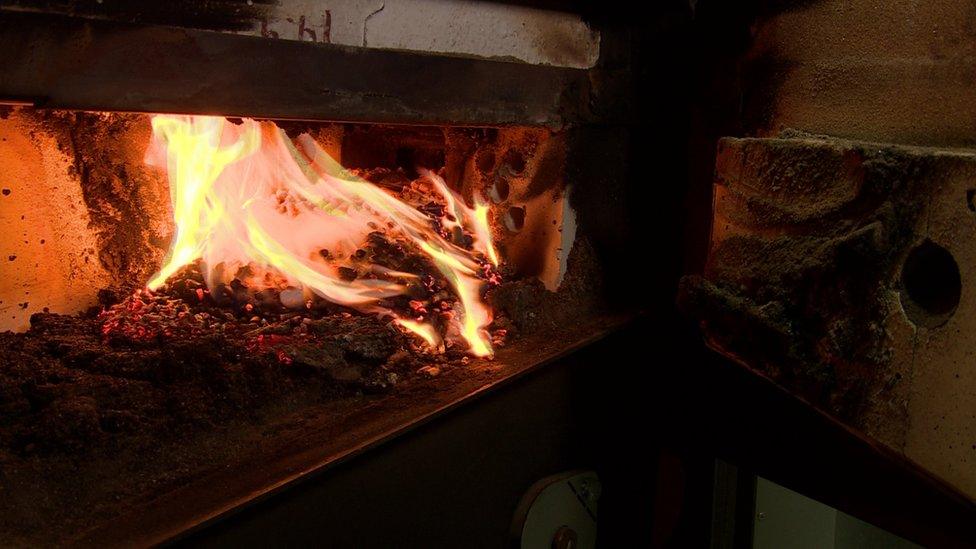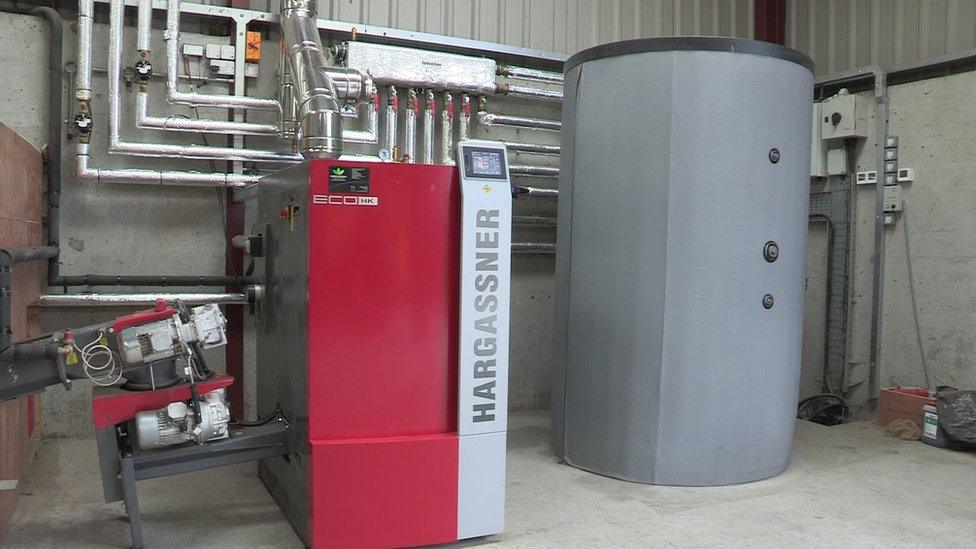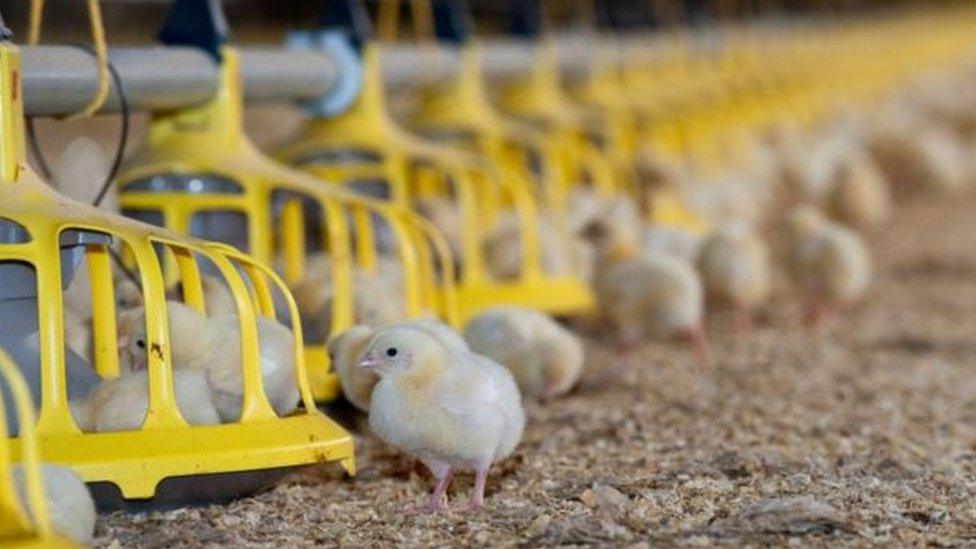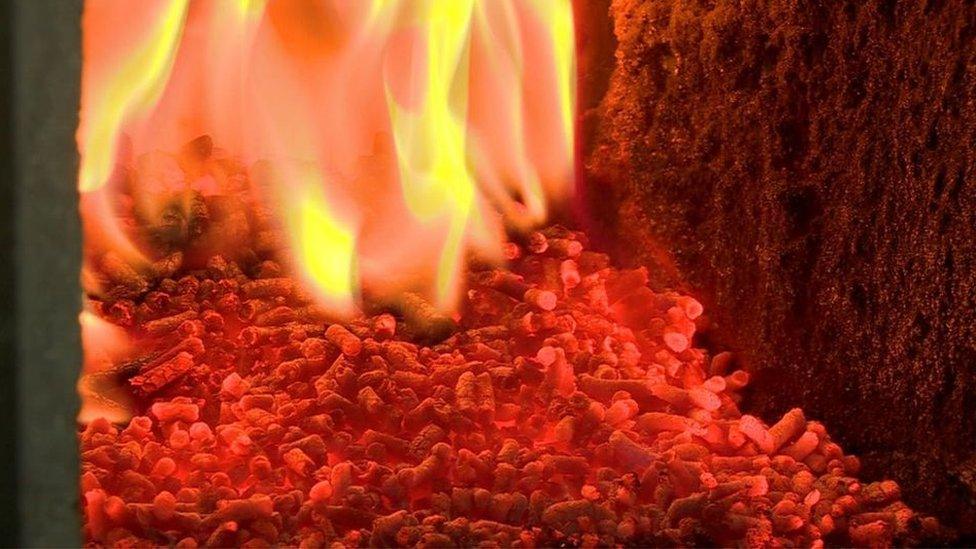RHI claimants got a "raw deal" MPs say
- Published

The scheme offered financial incentives for businesses to use renewable fuels to generate heat
Changes to Renewable Heat Incentive (RHI) scheme payments earlier this year meant a "raw deal" for participants, a committee of MPs has said.
The Northern Ireland Affairs Committee said the Department for the Economy should "revisit" deep cuts in payments.
It comes after businesses said the cuts had left them struggling.
Chairman Simon Hoare MP said firms in Northern Ireland now had payments which were worth "half as much" as in Britain or the Republic of Ireland.
The economy department said it had received the committee's report and would respond when it had considered the findings.
The Westminster inquiry began after legislation enabling the subsidy cuts was rushed through parliament in a single day in March 2019, fuelling claims that there been insufficient time for proper scrutiny.
The committee also called on Northern Ireland Secretary Karen Bradley to end the practice of passing Northern Ireland legislation quickly using what is known as "emergency procedures".
The Northern Ireland Office said it too would respond after considering the report.

A biomass boiler, similar to those owned by some RHI scheme claimants
The 2019 cuts meant that payments to the most common sized boiler in Northern Ireland fell from £13,000 a year to £2,200.
An equivalent scheme in Great Britain will pay out at least £5,300 - meaning a difference of tens of thousands of pounds over the 20-year term of the scheme.
The committee said it was concerned by evidence suggesting this could impact the competitiveness of poultry production in Northern Ireland, a key part of the agri-food industry.
About 800 of the 2,100 RHI scheme participants own chicken farms, with the bulk of them supplying processing giant Moy Park.
A court challenge will be heard later this year about the legality of the recent changes.
'Chilling reading'
Speaking to BBC Radio Ulster's Sunday News programme, Andrew Trimble from the Renewable Heat Association said the changes had impacted on the livelihoods of some participants.
"Many of the participants gave evidence to this committee on the basis of anonymity because they are embarrassed to have accepted the department's guarantees," he said.
"Some of the letters and some of the reports from scheme participants make for some pretty chilling reading.
"They report they had to sell their farms, that the banks have repossessed their home, which they placed as security against very considerable investment in renewable energy."

800 out of 2,100 RHI participants were poultry farmers
The department said it had to act because the existing subsidies were in breach of EU competition law on state support for businesses.
Failure to do so would have meant there would have been no legal basis for continued payments and the subsidies would have had to be stopped.
It said the difference in subsidy is because GB businesses put in boilers earlier, when the technology was more expensive.
Most were also using gas which was considerably cheaper than wood pellets and so required a bigger incentive to switch.
In Northern Ireland's scheme the equivalent fuel was oil, which is closer in price to pellets and so the subsidy rate could be set lower.
However many poultry producers who got into RHI were using liquid petroleum gas (LPG).
Not a subsidy
Boiler owners believed they had a government guarantee that payments would rise with inflation and many made long-term investment decisions based on the income.
The economy department has said the scheme was never meant to subsidise business, but was designed solely to incentivise companies to switch from fossil fuel to renewable heat.
The subsidy was only ever meant to cover the cost difference between the traditional and renewable boilers, any fuel price differential and provide a 12% rate of return on the investment.
But the original uncapped scheme was poorly designed and overgenerous, leading to overcompensation which threatened the Northern Ireland budget with what officials said was a potential bill of up to £700m, though the figure is disputed.
A series of cuts to the subsidy rate has avoided the risk of a massive overspend but means that available treasury cash will not now be drawn down.
The Northern Ireland Affairs Committee said whatever the outcome of the court challenge, the department had a "moral imperative" to consider any other reasonable investments firms had made when reviewing their payments.
- Published19 March 2019
